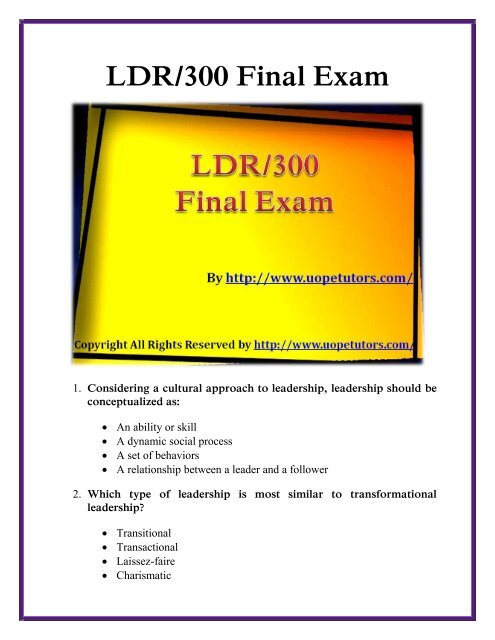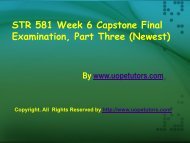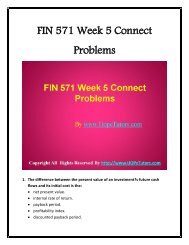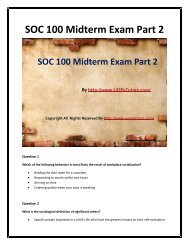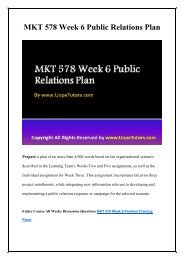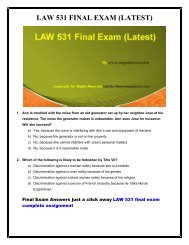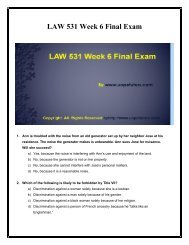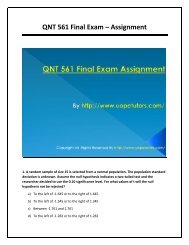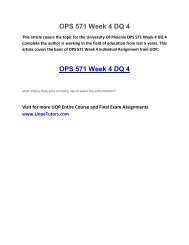LDR 300 Final Exam Answers
You also want an ePaper? Increase the reach of your titles
YUMPU automatically turns print PDFs into web optimized ePapers that Google loves.
<strong>LDR</strong>/<strong>300</strong> <strong>Final</strong> <strong>Exam</strong><br />
1. Considering a cultural approach to leadership, leadership should be<br />
conceptualized as:<br />
An ability or skill<br />
A dynamic social process<br />
A set of behaviors<br />
A relationship between a leader and a follower<br />
2. Which type of leadership is most similar to transformational<br />
leadership?<br />
Transitional<br />
Transactional<br />
Laissez-faire<br />
Charismatic
3. Your boss listens to employees personal problems and tries to create<br />
a positive work environment by being agreeable, eager to help,<br />
comforting, and uncontroversial. This is an example of:<br />
Middle-of-the-road management<br />
Team management<br />
Country-club management<br />
Authority-compliance management<br />
4. Contingency theory is concerned with ______ and _______.<br />
Traits; situations<br />
Leaders; followers<br />
Leadership; situations<br />
Styles; situations<br />
5. Leadership focuses on the ________.<br />
Importance of lateral and upward influence patterns<br />
elimination of dependency in relationships<br />
ways to increase a leader's following<br />
downward influence of a leader on his or her followers<br />
Find the final exam answers here just a click away <strong>LDR</strong> <strong>300</strong> <strong>Final</strong> <strong>Exam</strong><br />
<strong>Answers</strong><br />
6. Which of the following leadership theories expects the leader to<br />
continually be concerned about subordinate motivation?<br />
Contingency theory<br />
Situational leadership theory<br />
Leader-member exchange theory<br />
Path-goal theory<br />
7. Argued that the major activities of management and leadership are<br />
played out differently; but both are essential to an organization:
Jago<br />
Bass<br />
Kotter<br />
Zaleznik<br />
8. According to research, one way women can advance in leadership is<br />
By acting masculine and assertive, and not in feminine ways.<br />
By blending individualized consideration with inspirational<br />
motivation.<br />
By strongly resisting stereotype threats.<br />
By leading in a more democratic manner than men.<br />
9. In the skills model, which of these is a general cognitive ability?<br />
Problem-solving skills<br />
Information processing<br />
Motivation<br />
Knowledge<br />
10. Although there are clear differences between management and<br />
leadership,<br />
Management is more valued than leadership.<br />
There is little research to support one or the other.<br />
Leadership is more valued than management.<br />
The two constructs overlap.<br />
Click here to download the complete class of <strong>LDR</strong> <strong>300</strong><br />
11. Mary has managed the mailroom for 2 years. Management views<br />
Mary as a person with special leadership talent, such as intelligence,<br />
sociability, and determination. What approach is management<br />
using in assessing Mary?<br />
Trait approach<br />
Managerial grid approach
Attribution approach<br />
Styles approach<br />
12. The team leadership model puts who or what in the driver's seat of<br />
team effectiveness?<br />
Leadership<br />
Satisfying needs<br />
Leaders<br />
Management<br />
13. The following traits are associated with charismatic leadership:<br />
Intelligence, self-confidence<br />
Physical attractiveness, height<br />
Desire for power, desire to help others<br />
Self-monitoring, impression management<br />
14. Critical factors for developing a cultural based leadership<br />
development program may include:<br />
Focuses on the organization as a whole rather than the individual,<br />
demographic information, and formal data gathering.<br />
Focuses on all levels of an organization from the individual to the<br />
wider organization, gathers ethnographic data, and looks at many<br />
aspects of cultures.<br />
There are no critical factors. Leaders should be sent to various<br />
countries and allowed to learn that way.<br />
Starts the evaluation at the assessment phase, gathers formal data, and<br />
focuses on the language of the participants.<br />
15. In which way are leadership and power often approached?<br />
From the perspective of the follower<br />
As positional power<br />
As a relational concern for both leaders and followers.<br />
As a form of coercion<br />
Click here to download <strong>Final</strong> <strong>Exam</strong> <strong>Answers</strong> of <strong>LDR</strong> <strong>300</strong> <strong>Final</strong> <strong>Exam</strong>
16. Subordinates who have strong needs for affiliation prefer which type<br />
of leadership behavior?<br />
Participative<br />
Achievement oriented<br />
Supportive<br />
Directive<br />
17. Questionnaires on situational leadership often ask for respondents<br />
to look at specific applications of leadership styles within situations,<br />
which may result in:<br />
Wide range of responses that are hard to validate<br />
Results that are not in favor of situational leadership<br />
Negative perceptions toward the organizations<br />
Biased results in favor of situational leadership<br />
18. How does servant leadership differ from path-goal theory?<br />
Is unconcerned with the way leaders should treat followers.<br />
Makes the need for task completion necessary before relationships can<br />
thrive.<br />
Focuses on the need for leaders to perfect themselves before helping<br />
others.<br />
Focuses on the behaviors leaders should exhibit to put followers first.<br />
19. Of the Big Five personality factors, which is the most strongly<br />
associated with leadership?<br />
Extraversion<br />
Openness<br />
Emotional intelligence<br />
Social status<br />
20. Which best describes the reason situational leadership is so practical<br />
for managers to use?<br />
Its specific nature<br />
Its straightforward nature
Assist in relating demographics to leadership<br />
It is only applicable to lower-level managers<br />
Want to download the Complete Assignment..?? Click <strong>LDR</strong> <strong>300</strong> Complete<br />
Assignment<br />
21. Of the bases of power, research indicates that ________ power is<br />
most effective.<br />
Reward<br />
Personal<br />
Legitimate<br />
Coercive<br />
22. The leader is at the core of group change and activity, representing<br />
the backbone of the group or organization. Leadership is viewed as:<br />
Leadership as an act<br />
Personality perspective<br />
Leadership as a behavior<br />
Focus of group processes<br />
23. Critical life events affect authentic leadership because<br />
They reinforce patterned behaviors.<br />
They influence a multitude of people.<br />
They are a common occurrence.<br />
They act as a catalyst for change.<br />
24. What type of power did Bill Gates have when he and Paul Allen<br />
started Microsoft?<br />
Coercive<br />
Referent<br />
Expert<br />
Legitimate
25. If your superior tells you that she will offer you a raise provided you<br />
perform additional work beyond the requirements of your job,<br />
he/she is exercising ________ power.<br />
coercive<br />
reward<br />
legitimate<br />
personal<br />
To download <strong>Final</strong> <strong>Exam</strong> Questions and <strong>Answers</strong> just a click away <strong>LDR</strong><br />
<strong>300</strong> <strong>Final</strong> <strong>Exam</strong> Questions and <strong>Answers</strong><br />
26. The Ohio State studies considered the behaviors of consideration<br />
and initiating structure as:<br />
Cause and effect<br />
High value and low value<br />
Distinct and independent<br />
Interdependent<br />
27. During a speech given by your department director, he repeatedly<br />
emphasizes the importance of reaching goals set by the organization.<br />
He then goes on to lay out the framework to accomplish the goals.<br />
According to contingency theory, which best describes your<br />
director?<br />
High LPC score<br />
Relationship motivated<br />
Task motivated<br />
Position power<br />
28. Liz is a team leader at a local grocery store. Recently, her boss said<br />
that she needs to address the negative attitudes of employees. To try<br />
and fix this problem, she has begun awarding gift-cards to<br />
employees who have great attitudes. What internal leadership<br />
intervention is Liz addressing?
Satisfying needs<br />
Managing conflict<br />
Facilitating decisions<br />
Goal focusing<br />
29. Your parents and older siblings are all successful elected officials.<br />
After graduation, it is suggested by many that you should seek office<br />
and, in turn, offer you their support. Which best describes the<br />
leadership approach being demonstrated?<br />
Style approach to leadership<br />
Leadership as a process<br />
Trait perspective<br />
Expert power<br />
30. To create change, transformational leaders ______________.<br />
Value out-group member's opinions.<br />
Focus on the task at hand.<br />
Leave followers to work on their own.<br />
Become strong role models for their followers.<br />
About Author:<br />
This article covers the topic for the University of Phoenix <strong>LDR</strong> <strong>300</strong> <strong>Final</strong><br />
<strong>Exam</strong> (Latest). The author is working in the field of education from last 5<br />
years. This article covers the questions & answers of <strong>LDR</strong> <strong>300</strong> Complete<br />
Course from University of Phoenix. Other topics in the class are as<br />
follows:<br />
<strong>LDR</strong> <strong>300</strong> <strong>Final</strong> <strong>Exam</strong><br />
Want to check other classes..?? Visit http://www.uopetutors.com/


